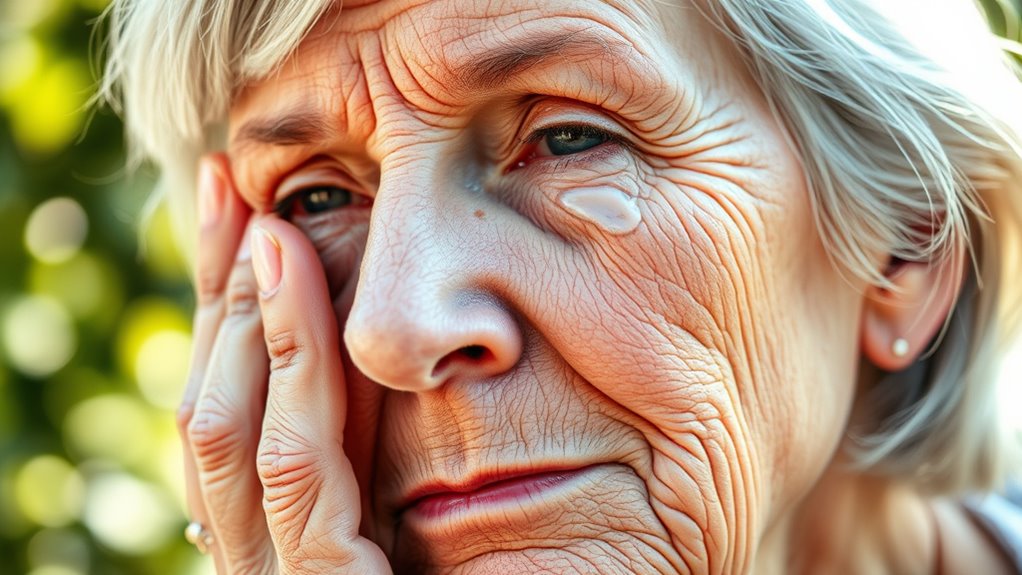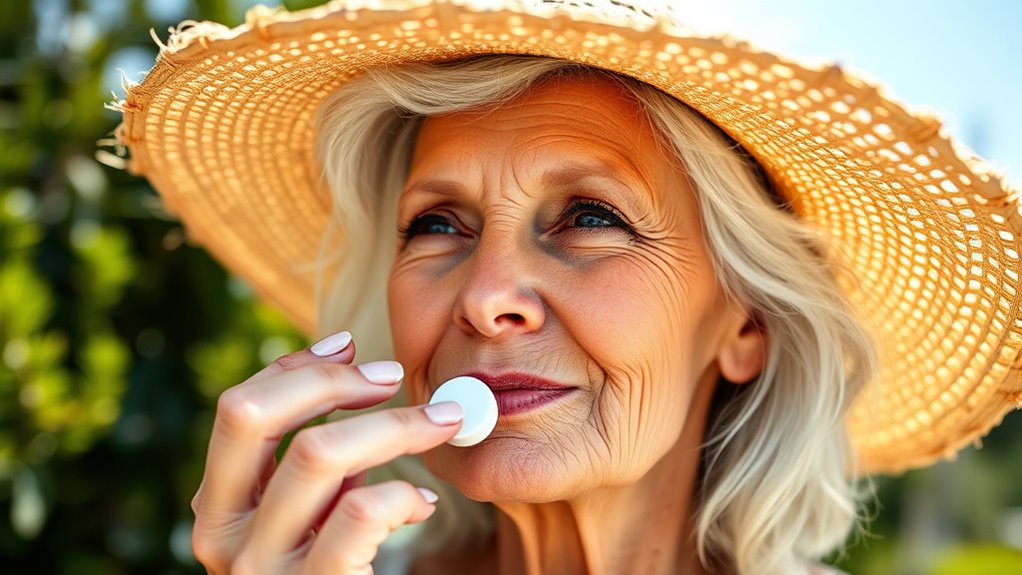To prevent dryness and skin cancer, you should consistently use broad-spectrum sunscreen with at least SPF 30, reapply every two hours, and wear protective clothing like wide-brimmed hats and UV-blocking sunglasses. Keep your skin well-hydrated by drinking plenty of water, eating water-rich foods, and applying moisturizers with ceramides or hyaluronic acid immediately after bathing. Maintaining these simple habits helps protect your skin’s health and resilience—learn more ways to care for your skin effectively.
Key Takeaways
- Apply broad-spectrum SPF 30+ sunscreen daily, reapplying every two hours when outdoors.
- Moisturize immediately after bathing with products containing ceramides, hyaluronic acid, or glycerin.
- Wear protective clothing, wide-brim hats, and UV-blocking sunglasses to shield skin from harmful rays.
- Use gentle, lukewarm water and sensitive skin cleansers to prevent skin dryness and irritation.
- Stay hydrated by drinking water and eating water-rich foods to support skin moisture and resilience.

Have you noticed how your skin changes as you age? It becomes thinner, more fragile, and often drier, making you more vulnerable to issues like irritation, cracking, and even skin cancer. To keep your skin healthy and resilient, focusing on essential care routines is key. One of the most important steps is sun protection. Exposure to UV rays accelerates skin aging and markedly increases your risk of skin cancer. Wearing broad-spectrum sunscreen with at least SPF 30 every day, even when it’s cloudy, creates a crucial barrier against harmful rays. Don’t forget to apply it generously to all exposed areas, including your ears, neck, and hands. Reapply every two hours if you’re outdoors for extended periods. Wearing protective clothing, wide-brimmed hats, and UV-blocking sunglasses also helps shield your skin from damage. Making sun protection a consistent habit drastically reduces the chances of developing skin cancer and prevents premature aging signs like wrinkles and age spots.
Hydration is another cornerstone of effective skin care for seniors. As you age, your skin’s natural ability to retain moisture diminishes, leading to dryness, itching, and discomfort. Incorporating hydration tips into your daily routine can make a noticeable difference. Start by drinking plenty of water throughout the day—aim for at least 8 glasses, more if you’re active or in hot weather. You can also enhance hydration by eating water-rich foods like fruits and vegetables, which support your skin from within. Using moisturizers regularly is equally essential; opt for those containing ingredients like hyaluronic acid, glycerin, or ceramides that effectively lock in moisture. Applying moisturizer immediately after bathing or washing your face helps seal in hydration and prevents dryness. If your skin tends to get very dry, consider using a humidifier in your living space to add moisture to the air, providing extra relief. Avoid harsh soaps and hot water, as they strip away natural oils, worsening dryness. Instead, choose gentle cleansers designed for sensitive skin and lukewarm water to maintain your skin’s barrier. Incorporating moisturizers with ceramides into your routine can also help repair and strengthen your skin’s natural barrier, especially in dry conditions. Additionally, understanding skin care for seniors and its importance can help you make better choices for your skin’s health. Regularly using hydrating skincare products can further support your skin’s moisture retention and resilience as you age. Studies have shown that consistent hydration and sun protection significantly improve skin health, leading to a more youthful appearance. Incorporating these hydration tips with consistent sun protection can markedly improve your skin’s health and appearance. Remember, maintaining moisture and shielding your skin from UV rays not only prevents dryness but also reduces your risk of skin cancer and other skin-related issues as you age.
Incorporating these simple but effective practices into your daily routine can help you manage the changes that come with aging skin. Prioritize sun protection and hydration tips, and your skin will thank you with a healthier, more resilient appearance.
Frequently Asked Questions
How Often Should Seniors Visit a Dermatologist for Skin Checks?
You should visit a dermatologist for skin checks at least once a year, especially since skin aging increases the risk of skin cancer. Regular visits help catch any concerns early. Remember, consistent sun protection and proper skincare are essential. If you notice new or changing moles, spots, or dryness, schedule a visit sooner. Staying proactive ensures your skin stays healthy and youthful as you age.
Are There Specific Skincare Ingredients Seniors Should Avoid?
You should avoid harmful ingredients that can increase skin sensitivity, such as fragrances, alcohol, and certain preservatives. These can irritate your skin or cause allergic reactions, especially as you age and your skin becomes more delicate. Look for gentle, dermatologist-recommended products with soothing ingredients like ceramides or hyaluronic acid. Always read labels carefully, and consult your dermatologist if you’re unsure about a product’s safety for your sensitive skin.
Can Seniors Safely Use Over-The-Counter Sunscreens Daily?
Think of daily sun protection as your shield against harsh rays. Yes, seniors can safely use over-the-counter sunscreens, especially those formulated for skin sensitivity. Look for broad-spectrum protection with SPF 30 or higher, and choose mineral-based formulas with zinc oxide or titanium dioxide. Applying sunscreen every day creates a barrier, reducing skin cancer risk and dryness. Just remember, consistency is key to keeping your skin healthy and vibrant.
How Does Medication Affect Skin Health in Seniors?
Medication can impact your skin health through side effects like dryness, irritation, or increased sensitivity. You might also experience topical drug interactions, which could worsen skin conditions or cause unwanted reactions. It’s important to inform your healthcare provider about all medications you take so they can recommend skincare routines that minimize these effects. Staying vigilant helps you protect your skin’s health and prevent issues like dryness or skin damage.
What Are Early Signs of Skin Cancer in Seniors?
You should watch for early signs of skin cancer, like new or changing moles, especially if they have irregular borders or color. Regular mole monitoring helps catch issues early. If you notice anything suspicious, a doctor might perform a skin biopsy to determine if it’s cancerous. Early detection is key, so stay vigilant about skin changes and schedule regular check-ups to keep your skin healthy.
Conclusion
Just as the wise old oak stands resilient against the storm, your skin can thrive with proper care. By protecting it from dryness and the sun’s rays, you’re guarding a precious treasure that tells your story. Remember, a little daily attention can keep your skin healthy and vibrant, much like the timeless tales of those who’ve weathered many seasons. Embrace these habits, and let your skin’s glow be your lasting legacy.









